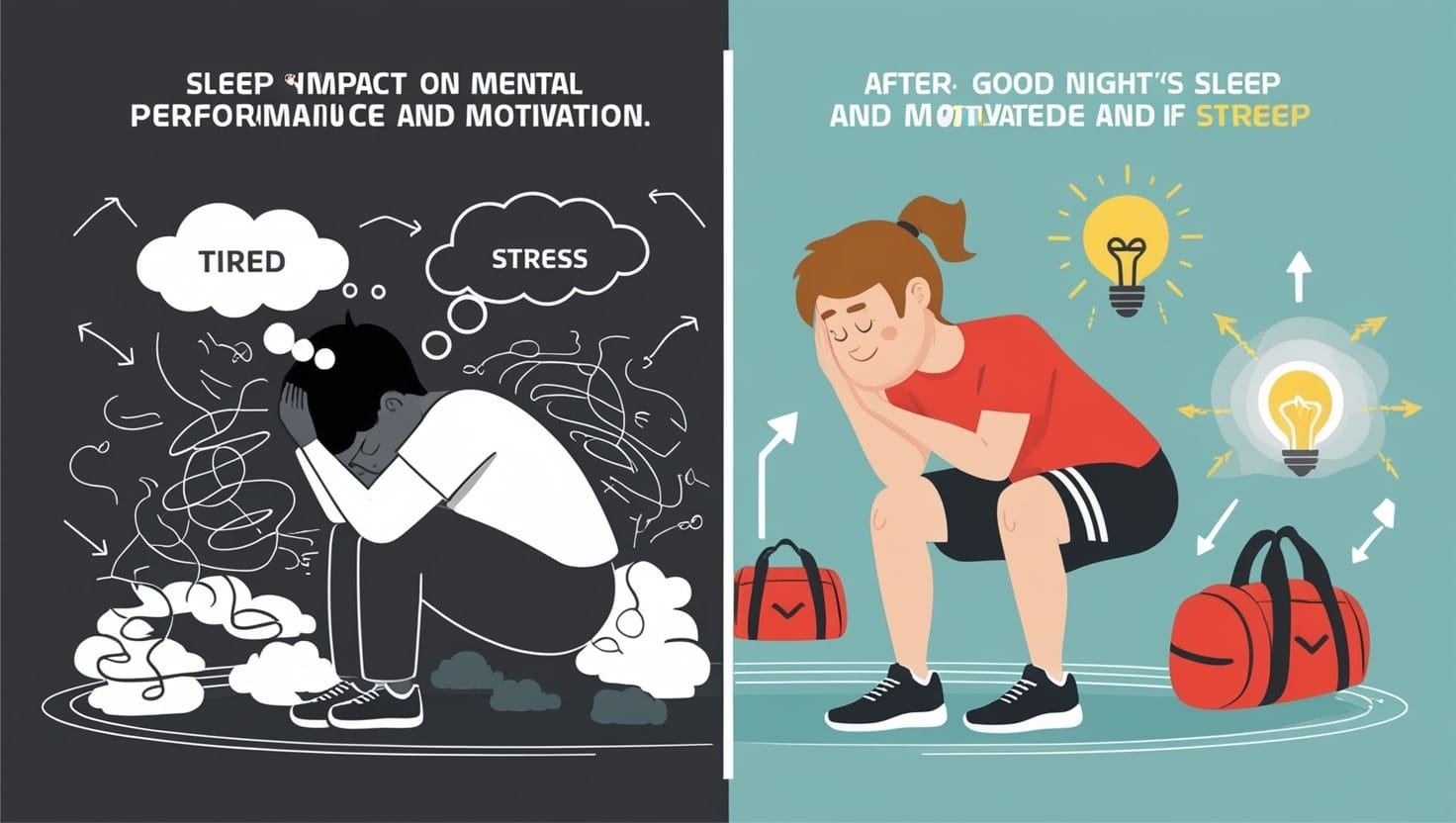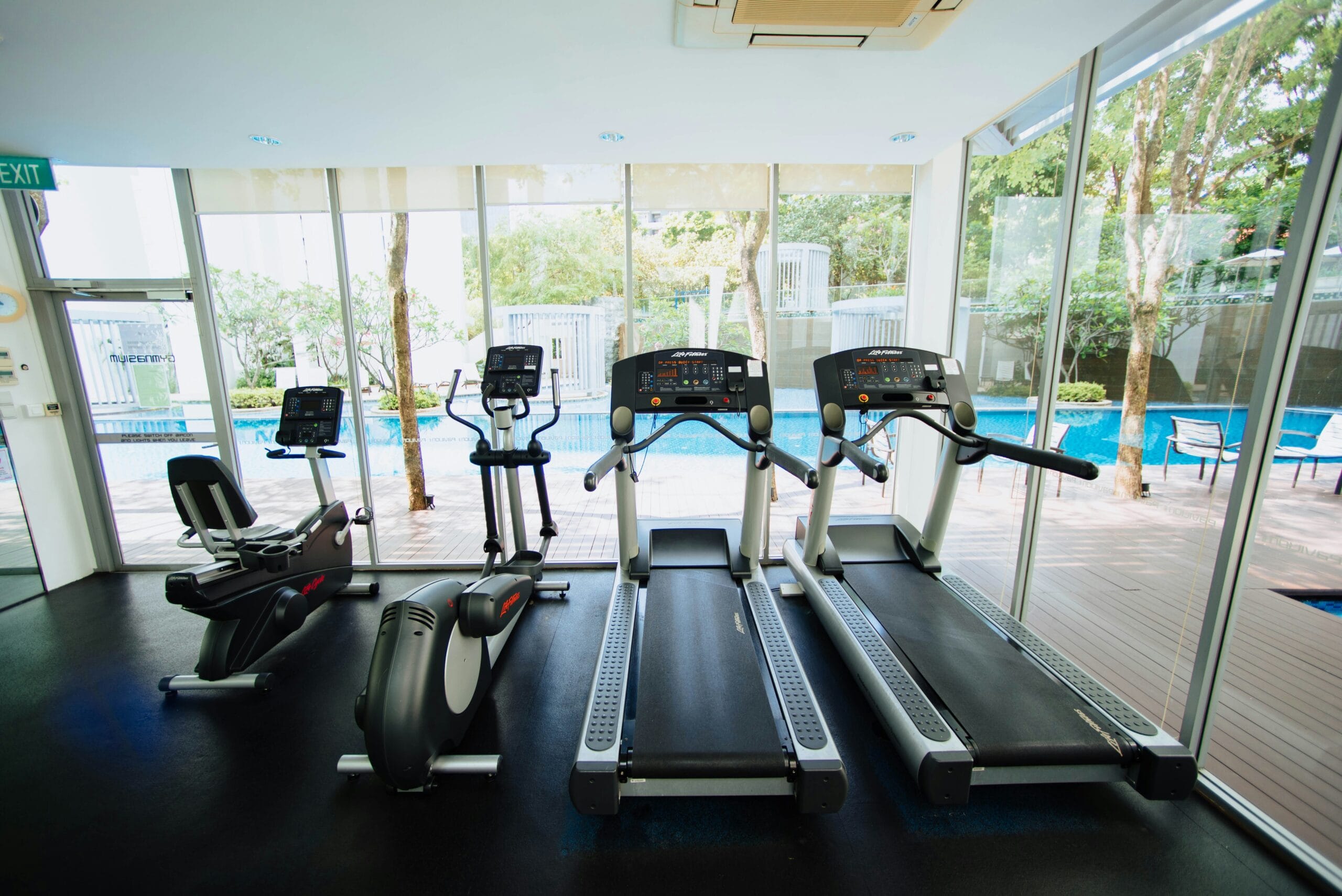
Introduction
In today’s fast-paced world, many people sacrifice sleep to keep up with busy schedules, often without realizing the impact it has on their bodies.
For fitness enthusiasts and athletes, sleep isn’t just about rest—it’s a critical part of performance and recovery.
When you don’t get enough sleep, your body struggles to repair muscles, restore energy, and regulate hormones that support strength and endurance.
This imbalance can lead to slower progress, reduced strength, and a higher risk of injury, no matter how hard you train.
Understanding the connection between sleep and workout performance is the first step toward maximizing your fitness potential and ensuring your efforts in the gym don’t go to waste.
If you want to keep your health good or you want to keep your body good, then let me tell you that you have to work hard and endure so much to make your body good and beautiful, but only this is enough. No, if you do all this and you don’t take care of your sleep, brother, I’m telling you the truth, brother, you won’t be able to reach the level you want, what you think, and what you dream of if you want.
So understand the story of your sleep, then look, brother, don’t get tensed, it’s your brother now, I’ll tell you to explain.

Impact on Physical Performance
Sleep deprivation directly affects your body’s physical capabilities, making it harder to perform well during workouts.
- When you don’t get enough sleep, your strength and endurance decrease and what muscles you have become very weak.
- Slower Reaction Time
Sleep affects the speed at which your brain processes information. A tired brain responds more slowly to stimuli, meaning your reaction time slows down. This can be particularly harmful in sports and exercises that require quick reflexes, such as running, basketball, or weightlifting. - Decreased Energy Levels
Lack of sleep drains your energy reserves, leaving you feeling fatigued and unmotivated. With low energy levels, it becomes much harder to push through a workout, leading to shorter and less intense training sessions.
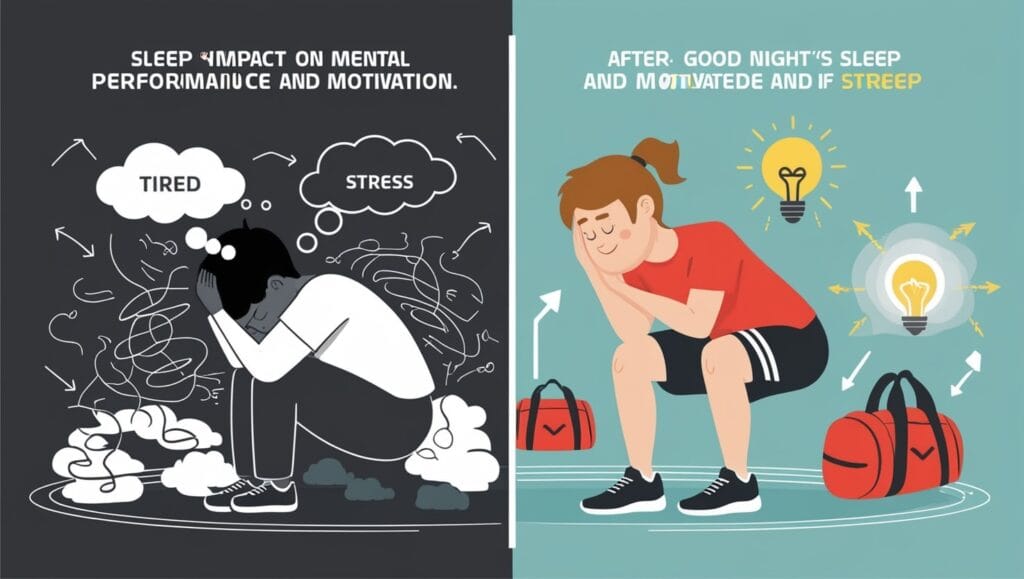
Impact on Mental Performance and Motivation
Well, because of your lack of sleep, not only will it affect your health, but it will also affect your brain. will be
- Poor attention and concentration
- Sleep is essential for mental clarity. When you’re sleep-deprived, your brain struggles to focus, making it difficult to stay focused during exercises that require precision or coordination. This lack of focus can lead to sloppy form, which increases the risk of injury.
- Low motivation
- When you’re tired, it’s hard to muster up the motivation to work. You may feel more inclined to skip workouts or cut them short. Over time, this lack of consistency can hinder your progress toward fitness goals.
- Poor Decision-Making
- A tired brain also leads to impaired decision-making, making it easier to rationalize skipping a workout or opting for unhealthy food choices that hinder fitness progress.
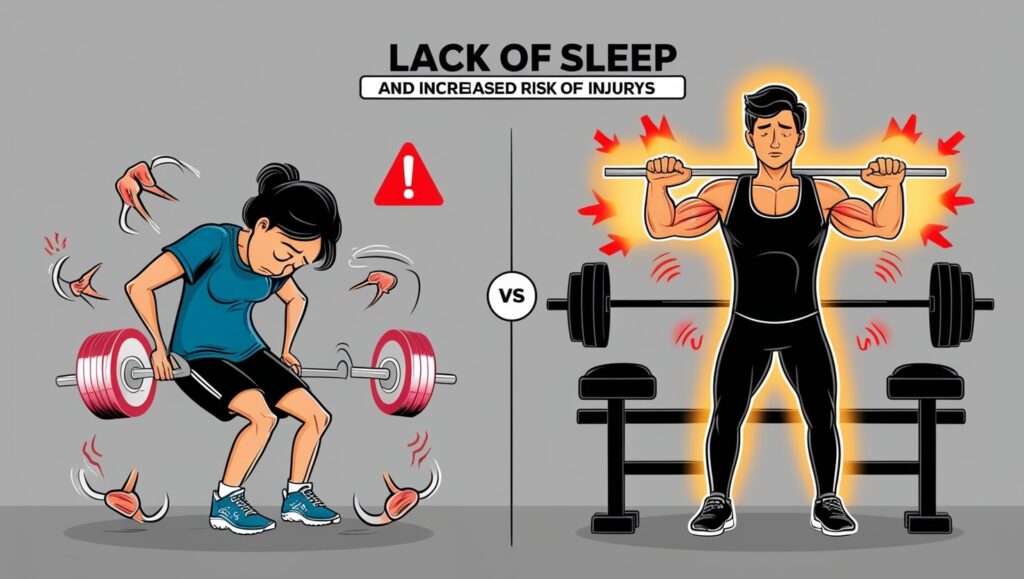
Increased Risk of Injury
Sleep plays an important role in keeping your body and mind sharp during exercise. When you’re sleep-deprived, your body’s coordination and balance are affected, increasing your risk of injury.
- Poor coordination
- Lack of sleep reduces your ability to coordinate your movements, making weightlifting, running, or complex bodyweight movements more dangerous. You’re more likely to lose balance, trip, or lose weight, all of which can lead to serious injuries.
- Slower Recovery Times
Sleep is when your muscles recover and repair themselves. Without enough sleep, your body’s ability to recover from previous workouts slows down. This can lead to overtraining and injury as your muscles aren’t getting the rest they need to rebuild.
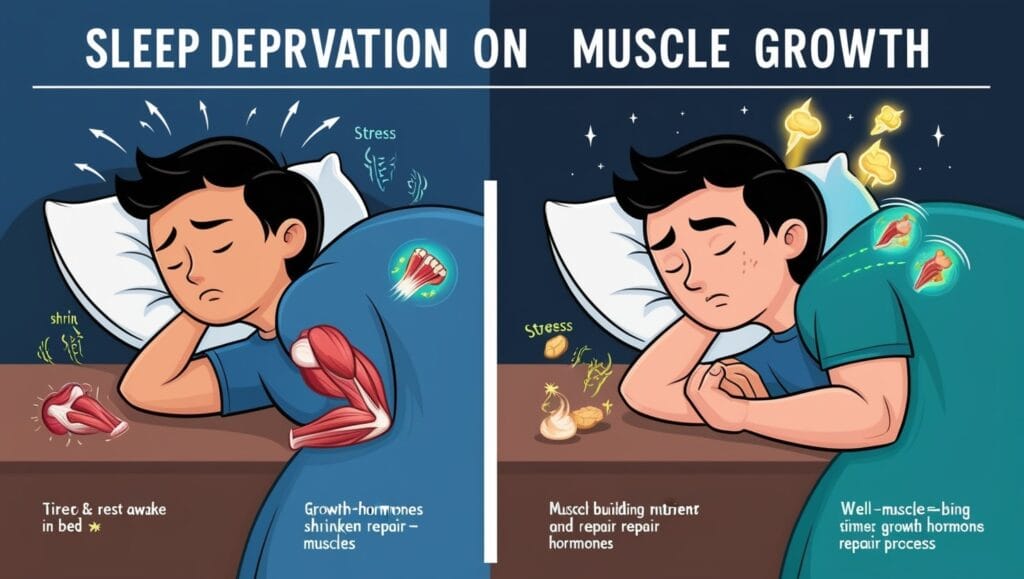
Sleep Deprivation and Muscle Growth
Lack of sleep also impairs muscle growth. Here’s how:
- Decreased production of growth hormone
- During deep sleep, your body releases growth hormones that are essential for muscle repair and growth. If you don’t get enough sleep, your body produces less of this hormone, which can delay muscle repair and limit muscle growth.
- Increased cortisol levels
- Cortisol, the body’s primary stress hormone, increases when you’re sleep-deprived. High cortisol levels break down muscle tissue and encourage fat storage, which works against your fitness goals.
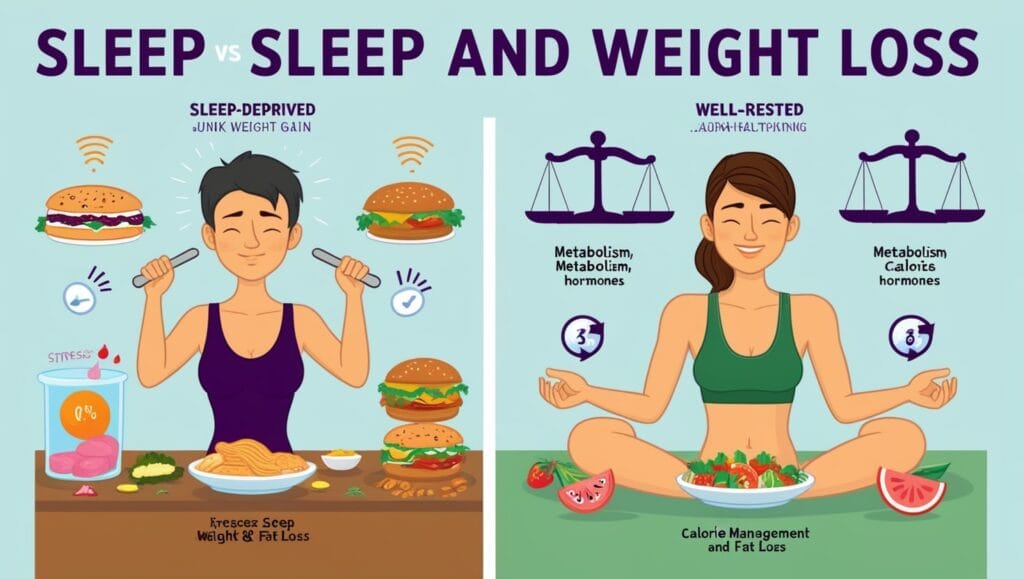
Sleep and Weight Loss
If you’re trying to lose weight, lack of sleep can sabotage your efforts in the following ways:
- Increase in hunger hormones
- Lack of sleep disrupts the balance of hunger hormones such as ghrelin and leptin. Ghrelin, which stimulates appetite, increases, while leptin, which signals fullness, decreases. This hormonal imbalance can lead to overeating and unhealthy food cravings.
- Slow metabolism
- When you’re sleep deprived, your metabolism also slows down, meaning you burn fewer calories throughout the day. This can make it difficult to create a calorie deficit, which is essential for weight loss.
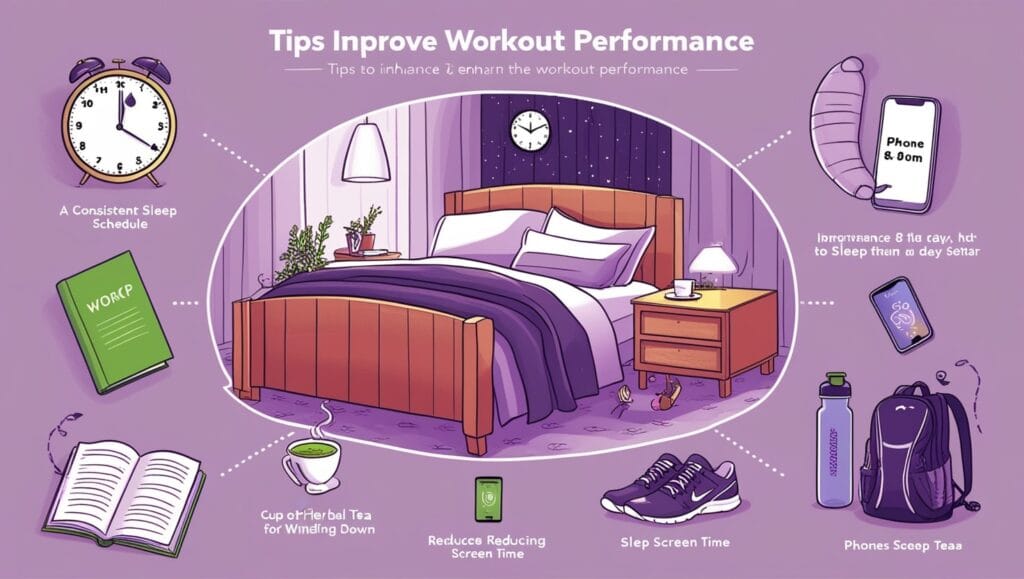
Tips for Improving Sleep for Better Workout Performance:
Improving your sleep can dramatically enhance your workout performance and overall fitness. Here are some tips:
- Establish a Regular Sleep Schedule
Go to bed and wake up at the same time every day, even on weekends, to regulate your body’s internal clock. - Create a Sleep-Inducing Environment
Make your bedroom conducive to sleep by keeping it dark, quiet, and cool. Use blackout curtains, earplugs, or white noise machines if necessary. - Limit Screen Time Before Bed
Avoid using phones, computers, or watching TV before bed. The blue light from these devices can interfere with melatonin production, which is critical for falling asleep. - Watch Your Diet
Avoid caffeine and large meals close to bedtime, as they can disrupt your sleep. Instead, opt for a light, sleep-friendly snack like a banana or a handful of almonds.
Conclusion
Sleep plays an essential role in workout performance and overall fitness. From reduced physical capabilities to impaired focus and coordination, lack of sleep can severely hinder your progress in the gym. By prioritizing quality sleep, you’ll not only enhance your performance but also reduce the risk of injury and accelerate recovery. So, the next time you’re tempted to sacrifice sleep for more workout time, remember that adequate rest is just as important for achieving your fitness goals.

